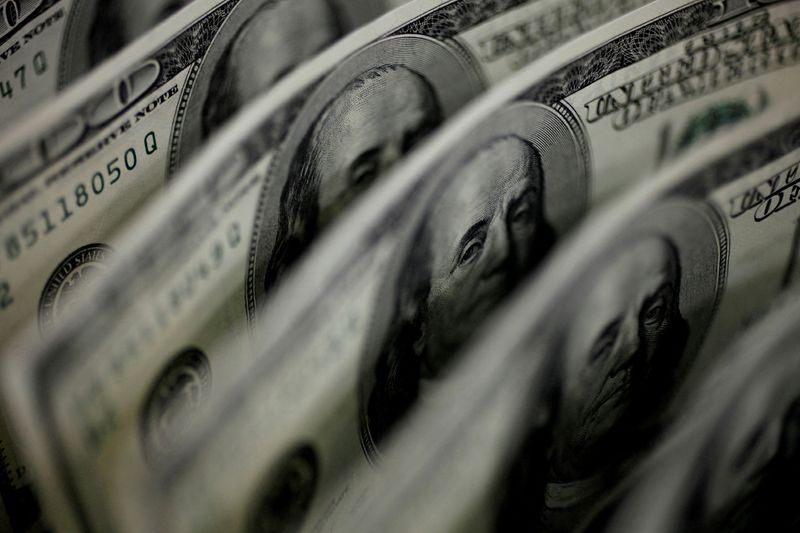
© Reuters. FILE PHOTO: A picture illustration shows U.S. 100-dollar bank notes taken in Tokyo August 2, 2011. REUTERS/Yuriko Nakao
By Elizabeth Howcroft
LONDON (Reuters) – Currencies including the Australian dollar and British pound fell on Monday on fears further curbs could be imposed in Europe to contain the Omicron coronavirus variant.
With last week’s slew of major central bank meetings out of the way, investors turned their focus to the rapid spread of the variant.
The Netherlands went into lockdown on Sunday and local newspapers in Italy reported that new restrictions were being considered there too.
“Investor risk sentiment has been undermined by further evidence over the weekend of the disruptive impact of the new Omicron COVID variant,” MUFG currency analyst Lee Hardman wrote in a note to clients.
“The stricter lockdown in the Netherlands will heighten fears that similar measures will be adopted in other European countries in the coming weeks.”
The “risk-off” tone was clear as European markets opened, but pulled back slightly as the session went on.
The Australian dollar, which is seen as a liquid proxy for risk appetite, was down 0.2% at $0.7109 at 1230 GMT, having earlier hit its lowest in 13 days.
Britain’s pound was down 0.2% at $1.32105. [GBP/]
British Health Minister Sajid Javid on Sunday did not rule out the possibility of further lockdowns before Christmas.
A slump in oil prices also hurt commodity-linked currencies. The Norwegian crown fell, with the euro up around 0.4% versus the crown.
“I wouldn’t be surprised if sterling, the Swedish crown and Norwegian crown are the G10 currencies which suffer from being the chosen ones to sell in a risk-off environment,” said Kit Juckes, head of FX strategy at Societe Generale (OTC:).
“Sterling really is the market’s favourite to go after.”
A further hit to market sentiment came from uncertainty over U.S. President Joe Biden’s domestic policy bill, known as “Build Back Better”.
A moderate Democrat who is key to passing the $1.75 trillion bill said on Sunday he would not support the package, citing concerns about inflation.
Goldman Sachs (NYSE:) cut its U.S. growth forecasts and the U.S fell to its lowest since Dec. 6 on Monday.
The was at 96.544 at 1231 GMT, not far from last month’s peak of 96.938, which was its highest since July 2020.
Speculators’ net long bets on the U.S. dollar, or bets that the dollar will rise, edged higher in the week to Dec. 14, reflecting a growing desire among market participants to hold the greenback.
Elsewhere, the euro was up 0.3% at $1.12695, only partly recovering after tumbling 0.8% on Friday after the European Central Bank took tentative steps to exit its pandemic-era stimulus.
China cut its lending benchmark rate for the first time in 20 months to prop up its slowing economy, sending the yuan to a 10-day low.
sputtered to another record low on Monday despite $6 billion in central bank interventions this month, after President Tayyip Erdogan doubled down on his unorthodox low-rates policy by referring to Islamic usury doctrine.
Meanwhile, cryptocurrencies bitcoin and ether were on track for a second consecutive day of decline. was around $45,765.67, having fallen far below an all-time high of $69,000 hit in November.
Graphic: World FX rates https://graphics.reuters.com/GLOBAL-CURRENCIES-PERFORMANCE/0100301V041/index.html
Stay connected with us on social media platform for instant update click here to join our Twitter, & Facebook
We are now on Telegram. Click here to join our channel (@TechiUpdate) and stay updated with the latest Technology headlines.
For all the latest Business News Click Here
For the latest news and updates, follow us on Google News.
